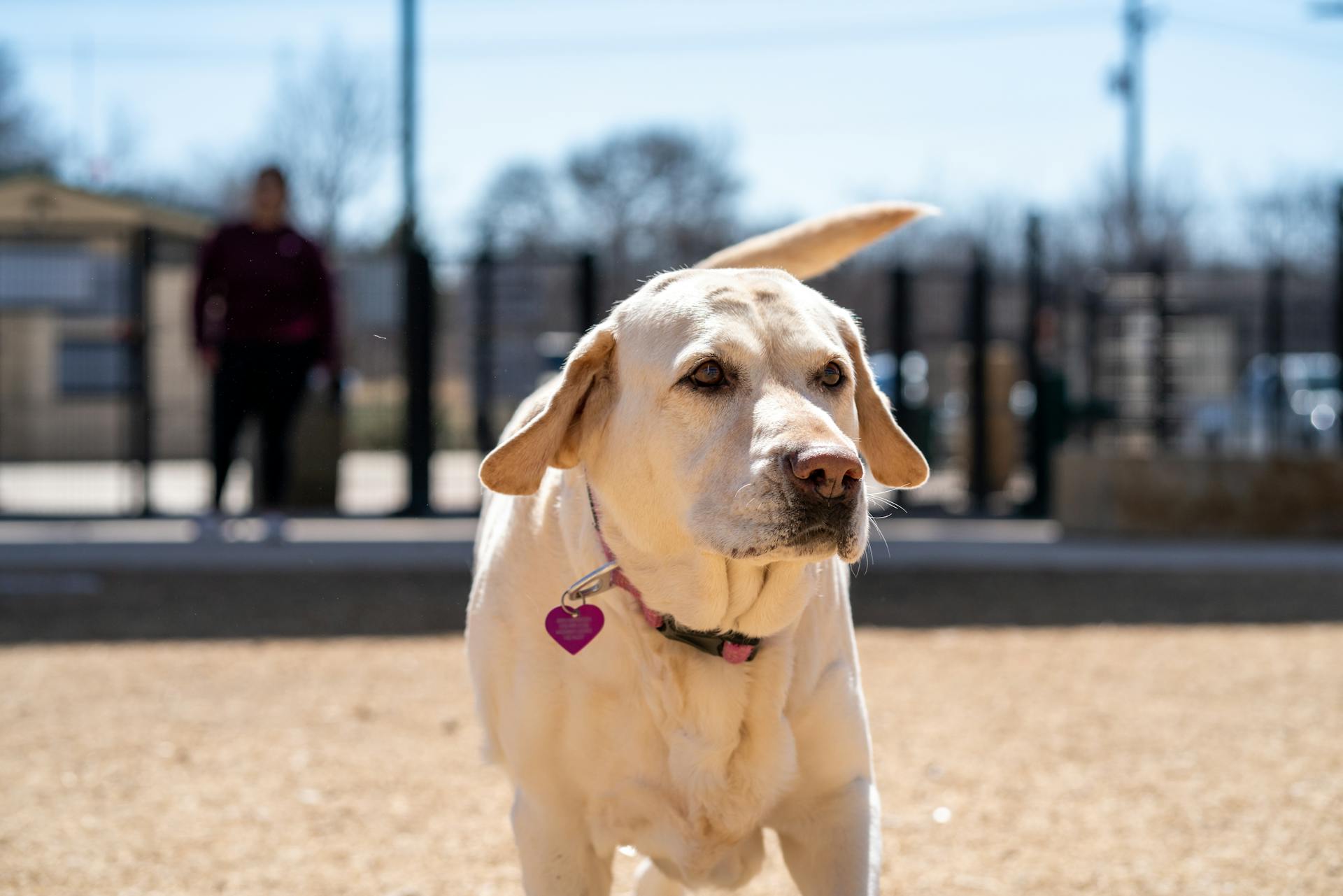
Dogs humping other animals is a common behavior that can be both puzzling and amusing to observe.
Dogs often exhibit this behavior due to a natural instinct to mount and assert dominance.
Some dogs may hump other animals as a way to mark their territory, as they have scent glands in their genital area.
In fact, dogs can even hump inanimate objects, such as pillows or toys, which suggests that the behavior is driven by instinct rather than a desire for sex.
This behavior is most commonly seen in intact male dogs, who may not have been neutered.
Intriguing read: Alpha Canine Behavior
Why Do Dogs Hump?
Dogs hump for a variety of reasons, and it's not just about sex. In fact, most instances of dog humping are about stress and anxiety.
One of the main reasons dogs hump is due to a surge of hormones, especially in unsterilized dogs. This type of humping is typically seen in dogs who aren't spayed or neutered.
Other reasons for dog humping include self-soothing, which can be a response to frustration, tiredness, anxiety, or fear. Dogs may also hump due to overstimulation, such as when they're playing at a dog park or when company arrives at the house.
Attention-seeking is another possible reason for dog humping, often seen in bored or high-energy pets who want to get their owner's attention. Some dogs may also hump due to medical conditions, such as urinary tract infections, prolonged or painful erections, or incontinence.
Female dogs may hump for the same reasons as males, including hormonally driven behavior and a desire to play with their owners or other pets. In fact, female dog humping can be a learned behavior from watching their male littermates.
Some common triggers for dog humping include sexual behavior, play, excitement, stress, and medical problems. For example, a dog may mount and rub against an object if they have itchy skin, which can sometimes lead to humping.
Here are some possible reasons for dog humping:
- Sexual behavior: Hormonally driven humping in unsterilized dogs
- Self-soothing: Humping as a response to frustration, tiredness, anxiety, or fear
- Overstimulation: Humping due to excitement or over-excitement
- Attention-seeking: Bored or high-energy pets seeking attention
- Medical problems: Humping due to urinary tract infections, prolonged or painful erections, or incontinence
Stopping Dog Humping Behavior
Dog humping can be a problem for multiple reasons, including the fact that the other animal may not tolerate it and react aggressively, and large dogs can hurt smaller or older dogs in their enthusiastic humping efforts.
Neutering your dog can help reduce hormone-related humping, but it's essential to address the behavior before neutering if it's driven by hormones. Hormone-driven behaviors can become lifetime habits even after neutering.
Dog humping is a completely normal behavior that both male and female dogs exhibit, and it can be triggered by various factors, including sexual behavior, self-soothing, overstimulation, attention-seeking, and medical conditions.
To stop your dog from humping, you need to get to the root of why they're doing it. Schedule an appointment with your veterinarian to rule out any medical or emotional issues linked to your dog's humping.
Preventing unwanted behavior can be achieved by exercising your dog thoroughly each day to drain their energy, avoiding encouraging the behavior in any context, distracting your dog before it starts, training your dog to leave other animals alone, teaching an acceptable behavior, keeping your dog away from excessively stressful situations, and working on standard obedience training.
Check this out: Certified Behavior Consultant Canine
Here are some strategies to distract your dog before it starts humping:
- Watch your dog and observe how they act immediately before starting the mounting behavior
- Distract your dog with a toy or game before it can engage in the behavior itself
By implementing these strategies and addressing the underlying reasons for your dog's humping behavior, you can help prevent unwanted behavior and create a more harmonious relationship with your furry friend.
Broaden your view: Dog Play Behaviour
Understanding Dog Behavior
Dogs hump other animals for a variety of reasons, and it's not always about sex. In fact, experts say that only about 10-20% of humping behavior is related to sexual behavior, with the rest being driven by other factors like stress, anxiety, and overstimulation.
Humping can be a self-soothing behavior for dogs who are feeling anxious or overwhelmed. Dee Hoult, a certified dog trainer, notes that humping can be a response to feeling overstimulated, which occurs in situations like dog parks or when company arrives at the house.
Dogs may also hump other animals as a way to initiate play or to get attention. Some breeds are more prone to humping due to their high energy levels and need for constant stimulation.
Here are some common reasons why dogs hump other animals:
- Sexual behavior (typically seen in unsterilized dogs)
- Self-soothing (in response to anxiety, stress, or overstimulation)
- Overstimulation (in situations like dog parks or with company)
- Attention-seeking (in bored or high-energy pets)
- Medical conditions (such as urinary tract infections or incontinence)
Reducing Dog Stress
Dogs hump for various reasons, including stress. Humping can become a lifelong habit if not addressed. If caused by stress, a dog can become more fearful and anxious over time, leading to high blood pressure and other medical issues.
Identifying the source of your dog's stress is crucial in reducing humping behavior. Consider the environmental factors that may be causing your dog stress, such as taking them to the dog park or daycare.
Some dogs hump as a way of policing other dogs' play, while others may hump people or other pets due to excitement and stress. Reducing excitement and stress through management and training can help alleviate humping behavior.
Here are some tips to reduce your dog's stress and prevent humping:
- Set up playdates with other dogs that your dog is more comfortable with.
- Plan visits to the park when there are fewer dogs.
- Keep your dog in a separate area until they've calmed down.
- Work on desensitization and counterconditioning with a certified dog trainer or behavior consultant.
- Provide other self-soothing activities for hyper or anxious dogs, such as puzzle toys or calming music.
By understanding the reasons behind your dog's humping behavior and taking steps to reduce their stress, you can help prevent humping and create a more harmonious home environment for both you and your dog.
Overview
Dog humping is a common behavior that can be confusing to understand. It's not just about sex, as many people assume. In fact, experts say that humping is a normal behavior for dogs, and it can be triggered by various factors.
Some of the most common reasons for dog humping include hormonal imbalances, excitement, stress, and playfulness. Female dogs can also exhibit humping behavior, especially if they're watching their male littermates.
Humping can be a sign of overstimulation, so it's essential to watch for other signs of stress or anxiety in your dog. If your dog is showing signs of stress or dislike, it's best to intervene and redirect their behavior.
Here are some common triggers for dog humping:
- Sexual: unneutered dogs may hump due to hormonal imbalances
- Play: humping can be a normal part of play behavior
- Excitement: over-excitement can lead to humping
- Stress: humping can be a response to stress and anxiety
- Medical problems: humping can be associated with itchy skin or bladder problems
It's worth noting that humping is not necessarily a sign of dominance, as some experts once believed. In fact, it's a complex behavior that can be influenced by various factors, including hormones, environment, and individual temperament.
When to Hire a Dog Behaviorist or Trainer
If you've exhausted all the steps to stopping a dog from humping, it may be time to call in a professional. A certified dog behavior consultant can teach you strategies to manage your dog's behavior off leash in play settings.
With a combination of obedience cues and behavior modification, an overly excited humper can learn to be more polite with other dogs. This is a common, typically harmless dog behavior that can be corrected with gentle redirection and lifestyle changes.
Hire a certified dog behavior consultant when you've tried everything else and your dog still has the issue. They can help you develop a plan to manage your dog's behavior and prevent unwanted humping.
A certified dog trainer can teach you strategies to manage your dog's behavior in play settings. With their help, you can learn to redirect your dog's energy and prevent unwanted humping.
A different take: Dog Play vs Aggression
When to Contact Your Vet
If your dog is excessively mounting and humping other animals, contact your vet for advice. They will check your dog for underlying health problems.
Aggressive behavior when trying to stop your dog from mounting is a red flag that warrants a vet visit. Your vet will discuss the best next steps to reduce the behavior.
It's likely your vet will recommend that your dog is seen by an accredited behaviorist.
If this caught your attention, see: Vets Dog Treats
Spaying/Neutering and Humping
Spaying or neutering your dog can significantly reduce humping behavior. In fact, dogs who are neutered are at least 60% less likely to mount or hump.
Spaying or neutering is especially beneficial for male dogs, who are more likely to hump than females. This is because humping behavior in males is often driven by hormones, which can become a lifetime habit even after neutering.
However, spaying or neutering alone may not completely eliminate humping behavior. If a dog has rehearsed humping behavior over and over, it can become self-reinforcing and persist even after neutering.
Here are some key facts about spaying or neutering and humping:
It's essential to address humping behavior prior to neutering, if it's driven by hormones. This will help prevent it from becoming a lifelong habit.
Contents and Overview
Dogs humping other animals is a common issue many pet owners face. This behavior is normal for dogs.
Mounting and humping is a behavior both male and female dogs exhibit, and it's not always sexually motivated. It's not uncommon for dogs to hump other animals, including dogs and even cats.
To understand why dogs hump, we need to look at the reasons behind this behavior. Humping is something both male and female dogs do, and despite popular belief, it’s not always sexually motivated.
If you're experiencing issues with your dog humping other animals, you're not alone. Training your dog not to hump usually involves distracting them, and if it’s hormone driven, neutering may also help.
Here are some common reasons why dogs hump:
- It can be a sign of anxiety or stress
- It may be a way for dogs to mark their territory
- It can be a learned behavior from other dogs
Frequently Asked Questions
Is it okay if male dogs hump each other?
Male dogs humping each other can be a sign of dominance or an attempt to establish a hierarchy, often due to a lack of spaying or neutering. Understanding the underlying reasons is key to addressing this behavior.
Sources
- https://www.preventivevet.com/dogs/how-to-stop-dog-humping
- https://be.chewy.com/why-do-dogs-hump-and-how-to-stop-dog-humping/
- https://www.pdsa.org.uk/pet-help-and-advice/pet-health-hub/symptoms/humping-behaviour-in-dogs
- https://unionlakeveterinaryhospital.com/blog/look-away-please-how-to-stop-a-dog-from-humping
- https://www.wikihow.com/Stop-a-Dog-from-Humping
Featured Images: pexels.com


